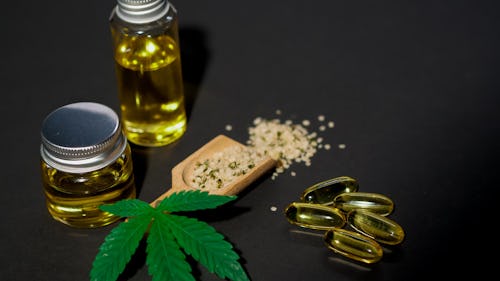CBD tinctures vs oil: What is the difference?
There is a lot of confusion regarding the differences between CBD tinctures and oils, but are there any differences between them? Yes, there are. Read this article to find the differences.

Key Takeaways
- CBD oils are made by diluting CBD extract with an inert oil carrier, while CBD tinctures are alcohol-based extracts of CBD.
- CBD tinctures are not as common as CBD oils.
- CBD oils are generally more expensive than CBD tinctures.
With the wide array of cannabinol (CBD) options available for use, it can get really confusing to figure out which is which or how these products differ from one another.
One common source of confusion is the interchangeable use of the terms 'CBD tinctures' and 'CBD oils.' You might find that many people say ‘CBD tinctures’ when they actually mean ‘CBD oil’.
Does this mean CBD oil and tinctures are one and the same?
The short answer is no.
In this article, we will explain the main differences between CBD tinctures and CBD oils to help you decide which is best for you.
CBD oil vs tincture: Do they mean the same?
CBD oil is sometimes used broadly to encompass both CBD oils and CBD tinctures. However, while the terms CBD oil and CBD tinctures are used interchangeably, they are different products. While they have some similarities, they also have several differences. For example, they are manufactured in different ways, have different potency levels, and half-lives.
What are CBD oils?
CBD oil is a form of CBD made from a blend of concentrated CBD extract and an inert carrier oil such as coconut oil or hemp seed oil.
CBD oil contains all the benefits of CBD and is useful in managing several conditions like chronic pain, arthritis or joint pain, anxiety, depression, epilepsy, migraines, and sleep disorders.
What are CBD tinctures?
CBD tincture is another type of CBD product. However, instead of oil, CBD tinctures are made with alcohol. CBD tinctures are made by steeping CBD plants or hemp into alcohol-based solutions for an extended period.
CBD tinctures are not as common as CBD alcohols, and many times when people say CBD tinctures, they often mean CBD oils.
CBD tincture vs oil: Extraction processes
One major difference between CBD tinctures and CBD oils is their extraction process. For CBD oils, manufacturers use carbon dioxide (CO2) to extract CBD. The CBD extract is then suspended in a carrier oil. Some manufacturers may also use gases like ethane or butane to extract CBD, but this process may leave harmful residues.
CBD tincture, on the other hand, is extracted by soaking the cannabis plant in alcohol for a long time, usually over several weeks. After extracting the CBD and other compounds, the liquid filtrate is then heated at a low temperature to remove the alcohol.
Once alcohol is evaporated, what is left behind is a concentrated CBD tincture. CBD tinctures may be mixed with a carrier oil to improve the ease of use or diluted to reduce the concentration.
CBD tincture vs oil: Their tastes
CBD tinctures usually have a bitter taste due to their extraction process with high-proof alcohol. However, many CBD brands often mask the taste of tinctures with sweeteners, flavorings, or vegetable glycerin.
In its raw form, CBD oil also has a hempy and earthy taste, which some people might find unpleasant. However, when properly processed, the taste might be more pleasant. Just like tinctures, many brands may mix CBD oils with delicious flavorings to improve the taste.
CBD tincture vs oil: Methods of ingestion
CBD oils can be taken orally, topically (like a lotion), or sublingually (under the tongue). Using CBD oil sublingually allows for faster absorption of CBD directly into the bloodstream. You may also inhale the oil using vape cartridges.
Just like CBD oils, CBD tinctures can be used orally and sublingually. Although you could also use CBD tinctures topically, using them on your skin is not recommended due to their alcohol content.
CBD tincture vs oil: Differences in cost
CBD oils require specialized equipment for their extraction, so they are generally more expensive than CBD tinctures. However, although CBD oils may generally cost more, it is still possible to find lower-quality CBD oils that are priced similarly to CBD tinctures.
Pros and cons of CBD oil
CBD oil has its benefits and disadvantages over other forms of CBD
Pros
- Ease of administration
- Quick absorption
- It can be used topically
- Versatility of use (can be mixed with food and beverages, applied topically, or used sublingually).
- Long shelf-life
- Options for flavors
Cons
- It may be relatively more expensive than other forms of CBD
- The earthy, hempy taste can be unpleasant to some people
- It may be difficult to gauge the dose
Pros and cons of CBD tincture
CBD tincture has some pros and cons, including:
Pros
- Easily dosed
- Fast absorption as they are typically taken sublingually
Cons
- Bitter taste
- Not effective when used topically
- Not readily available
Which is better? CBD oil or CBD Tincture?
There is no standard answer to which product is better; both CBD oils and CBD tincture are effective—It all comes down to preferences. For example, If you are allergic to coconut oil, you might want to go for a CBD tincture without a carrier oil. The same goes for someone looking to avoid alcohol.
However, in terms of accessibility, most products in the markets are oils, not tinctures, so if you want a CBD product that is readily available, then you may be better off using CBD oil.
To decide which CBD form is better for you, the best thing is to look at the pros and cons and find out which form best suits what you are looking for.
Read Next: